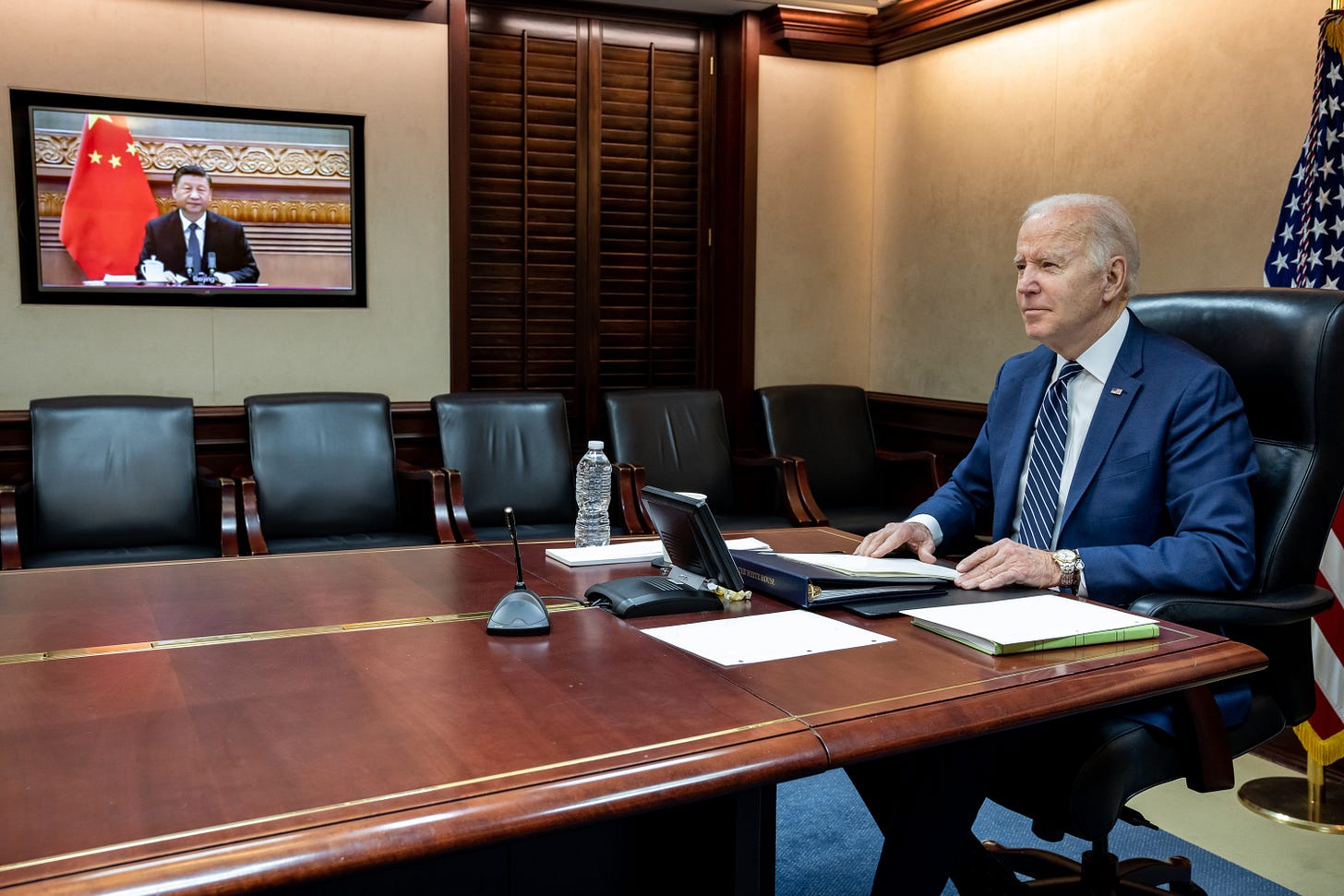Confidence — A Vital Ingredient for Winning Our Competition with China
And why we are justified to have it
The People’s Republic of China brazenly violated American sovereignty by floating an intelligence-gathering balloon through our airspace. So far, there are many questions and few answers. What went wrong that the balloon could be spotted by Montana residents? Or was it on purpose? If so, why? What should the U.S. protocol be for such spy operations? Why was the response this time different than in the past? Why weren’t we told about earlier alleged Chinese balloon incursions? Why didn’t Biden shoot it down earlier? Should we scan the sky proactively for balloons and shoot them down above our territorial waters before they reach our land? (As someone from Montana with my family still living there, I am very grateful that President Biden did not order for it to be shot down above Montana!) And why isn’t the Chinese Ministry of Defense answering our phone calls?
However, there is one bigger question that also needs to be answered. Why do we, Americans collectively, sound so scared, nervous, and unconfident in reacting to this balloon? Some are calling this incident an ‘act of war’. Others are comparing it to the 1957 Cold War Sputnik moment. President Biden’s critics are yelling that this event shows his weakness in dealing with the China threat.
This angst is misplaced. Dealing with the China threat is the central American foreign policy challenge in the 21st century. In 2017, President Trump’s National Security Strategy rightly diagnosed the China challenge, calling it, together with Russia, a “revisionist power” that wants “to shape a world antithetical to U.S. values and interests.” President Biden’s National Security Strategy echoed the same assessment, calling China “the only competitor with both the intent to reshape the international order and, increasingly, the economic, diplomatic, military, and technological power to do it”. The Strategy added that “the military will act urgently to sustain and strengthen deterrence, with the PRC as its pacing challenge.” (Emphasis added)
To deter, contain and manage the China threat, the Trump and Biden administrations have rightly initiated a series of new policy responses. (I’d argue that President Obama and his Asia pivot did too, but let’s leave this discussion for another day.) But I see one crucial element missing – confidence. Yes, the China challenge is the most serious one facing U.S. policymakers today. But we are up to the task. Just as we did during the Cold War, we have the capabilities, allies, and ideas to win this new competition with China. But we don’t act like it. We act scared. We sound uncertain. It’s time to change our mindset.

The United States is the most powerful country in the world. Yes, China is closing the gap in certain metrics, but in the aggregate, it still lags behind. An increasingly popular image is that of China rising and the United States falling. It’s a perception that President Xi Jinping wants you to believe. As he said, “the East is rising, and the West is declining”. However, this metaphor is incorrect. Rather, think of the United States and China as racing a two-mile run. The United States is ahead of the rest and is widening the gap. China is between the U.S. and the rest and is accelerating. China is closing in. But whether China eventually catches up is not a given.
First, regarding military power, the United States is still firmly ahead. According to the Stockholm International Peace Research Institute, the U.S. spent $801 billion in 2021, or 3.5% of GDP. China “only” allocated $293 billion, or 1.7% of GDP. On nuclear weapons, the United States is also still way ahead, with 5550 nuclear warheads compared to China’s 350. Breaking down these aggregate numbers into ships, soldiers, missiles and the like reveals a more complex picture showing that China is ahead or closing the gap in some categories, while we are ahead in others. (Stay tuned for more on this topic in future pieces.) But in the aggregate, the United States still has the most powerful military in the world. And as our enemies in previous wars learned, we have tremendous capacity to mobilize even greater resources when compelled to do so.
Moreover, we are not alone in this military race. China mostly is alone. The United States has the best and most allies in the world, in both Europe and Asia. First and foremost, we anchor NATO, the largest, most enduring, and most powerful military alliance in the world. And it’s still growing. We also have several strong Asian allies and they’re getting stronger. Recently, under President Biden’s leadership, the new Indo-Pacific security alliance with the U.K. and Australia, “AUKUS”, was established and Quadrilateral Security Dialogue, or “Quad”, with Japan, India, and Australia was renewed. Recently, our close ally, Japan, adopted a new national security to upgrade its military capabilities. Just last week, Secretary of Defense Lloyd J. Austin III, together with his South Korean counterpart Lee Jong-Sup, marked the 70th anniversary of the ROK-U.S. Alliance, and pledged to bolster it.


We are part of a strong team. China is not. China and North Korea are nominal allies. China’s other alleged major military partner, Russia, is faring very poorly in Ukraine right now.
Second, regarding economic power, China is ahead in some respects. But it has not closed the aggregate gap with the United States. Its economic future is also uncertain. Growth is slowing down. The Chinese population is getting older too fast and birth rates are at a historical low. Immigration is virtually non-existent. In GDP per capita terms, China still ranks well below the United States, or $13,630 compared to $78,420. And history has shown us how hard it is to move from a middle-income to a high-income economy. It is not clear whether China will ever make it.
Similar to measures of military power, the United States has a lot of economic friends compared to the PRC. The U.S. and China are the top two economies in the world. But nine of the 10 largest economies in the world in 2022 were democracies. Seven of the 10 are allies of the United States. And India, one of the top 10 economies in the world not aligned with the U.S., is nonetheless much closer to the United States than to China.
Third, regarding ideational power, the U.S. also has big advantages over the PRC. As Winston Churchill once quipped, “democracy is the worst form of government – except for all the others that have been tried.” He’s still right. To be sure, American democracy has not inspired many lately. The January 6, 2021 assault on the U.S. Capitol marked a low point in the functioning of U.S. democracy. The constant violation of the human rights of Black Americans, including wrongful deaths carried out by the police, makes it hard for us to preach to the rest of the world to be more like us. In fact, I firmly believe that our greatest threat to American security comes not from Beijing or Moscow, but from polarization and democratic erosion in our own country. It’s a threat from within, not from the outside. But if we can get our act together at home, we will be just fine in dealing with China.
And yet, despite American struggles, opinion polls show that most people around the globe still prefer democracy to autocracy. According to the Pew Research Center survey, 78% of respondents from 38 countries said a representative democracy would be a good way of governing a country, while only 26% said that about “rule by a strong leader”. Today, there are more democracies than ever before. And while the Chinese state-led, autocratic model of economic development is attractive and a real alternative to the Western liberal economic model, when has the world ever witnessed mass uprisings demanding to overthrow democracy? Think of the last several decades, starting in Eastern Europe in 1989, and later Tunisia, Egypt, Russia, Hong Kong, Belarus, and Iran - the world has witnessed many mass uprisings against autocracy and in favor of democracy. Is anyone today demanding the imposition of dictatorship? Are there popular protests calling for the creation of the Chinese system of government? I can’t think of any. And 2022, as I wrote here in December, was a good year for small d democrats around the world and a bad year for autocrats. In recent years, China’s image around the world has taken some real hits.

So, in our hard power, economic, and ideological competition with China in the 21st century, Americans have good reasons to be more confident.
Confidence is not just a reflection of capabilities, but also a key stimulus for increasing them. When my sons were in grade school, I used to coach their basketball teams. In basketball, confidence is everything. When my sons and teammates had the swagger of a Michael Jordan or Kobe Bryant, they played much better than when scared or intimidated. Americans need more swagger – more confidence – in dealing with balloons today and the Chinese Communist Party threat over the coming decades.
What are your thoughts? I’m writing a new book on these issues, so I am eager to get your feedback. I’m still learning. You can see some of the ideas for the book in this presentation I gave before, called “U.S.-China relations today. Lessons from the Cold War”.



Whenever I feel depressed about the state of this country, I ask myself: where would most people around the globe rather move? To America? Or to Iran or Russia or China or N Korea?
Ultimately, as you point out, almost nobody aspires to live in an autocracy. As long as we can resist the autocratic movement in our own country, I agree that we will prevail over autocracies elsewhere.
Thank you for these wonderful essays, Professor McFaul. I am a huge admirer, and eagerly read every word you write!
A question I have regarding something you’ve touched on in other pieces—why can’t we or aren’t we doing more to combat ant-Western anti-Democracy disinformation inside autocracies?
Thanks for sharing your views and excellent writing. I agree with your overall description of the situation. However, the term “confidence” can be problematic and even concerning, at least to me. Allowing me a bit of devil’s advocacy, I counter that “confidence” may not be the “secret to the sauce” of U.S. success or superiority. I cannot help but conflate “confidence” with “over-confidence” or even “arrogance.” One of our biggest enemies is complacency and even over-confidence in our capabilities; just because one spends (or wastes) a lot on military does not mean one is prepared. A modicum of fear and insecurity may go a long way to keeping us on our toes, self-aware, and on-guard. I’ve worked with plenty of arrogant/confident senior USG officials that have painted themselves into their own narrow-minded corners. The Ukraine-Russia situation may serve as a clear warning to any large power “confident” in its capabilities and resources.
As you mention, our strengths have also come from our nature and ability to develop and assist allies, even turning former enemies into like-minded nations. Molding such relationships does not come from an abundance of confidence, but perhaps from an ability to understand our own weaknesses and endear our values on others. The balance between empathy and confidence can be precarious as well.
So, I might posit that confidence isn’t the crux of the issue, but rather our lack of unity (political-social) and our inability to protect ourselves from outside forces that seek to divide us by exploiting our differences. It is these forces that erode our resiliency – our unity and our “confidence” in our long-standing democratic values and institutions.